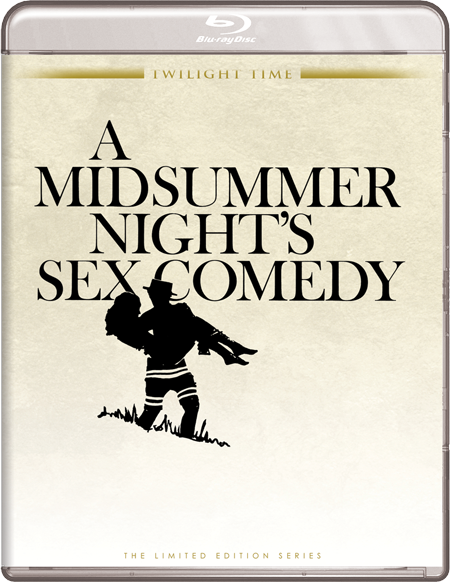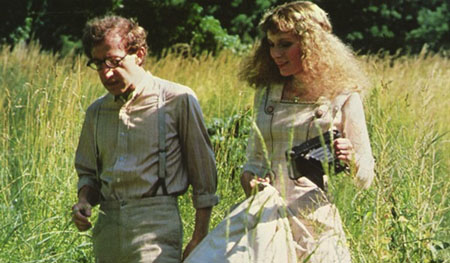
“SMILES OF A
CHEKHOVIAN NIGHTâ€
By Raymond Benson
Most
cinephiles know that Woody Allen is a huge fan of Ingmar Bergman. Allen has
paid homage to the Swedish master several times, and his 1982 work, A Midsummer Night’s Sex Comedy, is an
example. It draws upon one of Bergman’s very few comedies, Smiles of a Summer Night (1955), which is also the basis of the
Stephen Sondheim Broadway musical and later film, A Little Night Music.
Smiles takes place at the
turn of the last century (1800s to 1900s) in a rural village in Sweden, and the
story follows the bawdy escapades of several couples. Likewise, Allen’s Midsummer takes place in the same time
period, although the story is transplanted to “the country†somewhere in New
York state, and concerns an ensemble of six characters—three couples—who also
embark on bawdy escapades.
Bergman’s
original film, in turn, is inspired by the works of Anton Chekhov. Smiles of Summer Night is light,
intellectual, and explores manners and morals with an undercurrent of serious
sexuality bubbling underneath—just like some of Chekhov’s comedies. The Russian
playwright’s comedies are not belly-laughers; instead they are subtle, amusing,
and effervescent. You smile at them.
Bergman’s Smiles is the same way, as
is Allen’s Midsummer.
That
said, Midsummer is not one of Woody
Allen’s better films. It’s all right—it’s not bad, it’s just very, well, light.
A fluff piece. Something he made to fill some time. He had actually shot Zelig prior to making Midsummer, but the visual effects of the
former film were taking longer than expected—so Allen wrote, produced, edited,
and released Midsummer in the interim
(Zelig was released in 1983).
There
are perhaps two significant aspects to Midsummer—one
is Gordon Willis’ gorgeous color cinematography, which excellently captures the
“enchanted†forest and pastoral mood of the film, and the other is that it’s
the first of Allen’s releases featuring Mia Farrow as a co-star. Unfortunately,
as opposed to several other of the director’s movies made later in the decade, Midsummer does not show off Farrow’s
talents particularly well.

Allen
plays Andrew, an “inventor†married to Adrian (Mary Steenburgen). They are
having marital problems, although their love for each other is evident. They’ve
invited two couples out to the country for a weekend—Leopold, a randy old
professor (Jose Ferrer) and his young fiancé Ariel (Farrow), and
Maxwell, a randy young doctor (Tony Roberts) and his adventurous nurse, Dulcy
(Julie Hagerty). Throughout the course of the weekend, couples mix,
relationships are challenged, and the promise of sex dominates everyone’s mind.
Throw in a little magic (the forest is “enchantedâ€),
and you have a light little romp of a comedy.
Twilight
Time’s limited edition Blu-ray (only 3,000 units) features a 1080 High
Definition transfer that beautifully brings out the colorful settings. It comes
with a 1.0 DTS-Master Audio soundtrack, plus an isolated music track (the score
is made up of lively classical pieces by Felix Mendelssohn). The theatrical
trailer is the only supplement. The booklet contains an informative essay by
film critic Julie Kirgo.
In
the grand scheme of Allen’s nearly fifty titles, Midsummer resides somewhere in the lower third, to be sure. Nevertheless,
it provides 88 minutes of amusement in the way a nice European pastry is
pleasing to the palate. Enjoyable while it lasts, but then it’s gone.